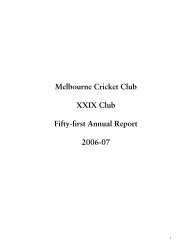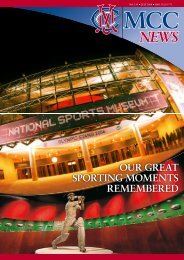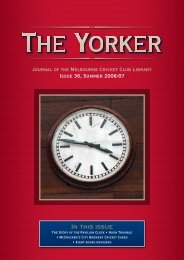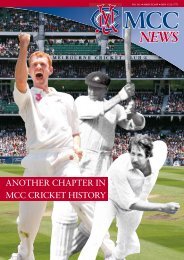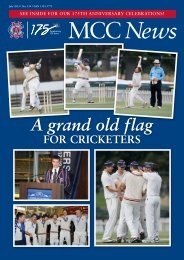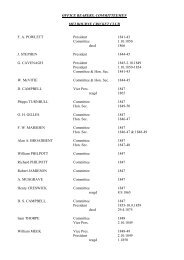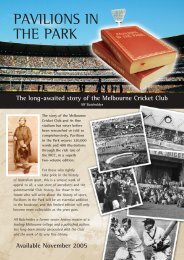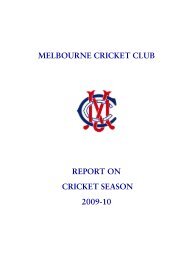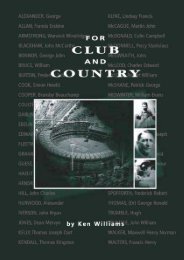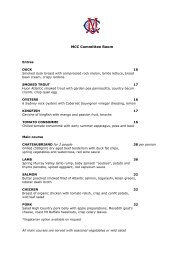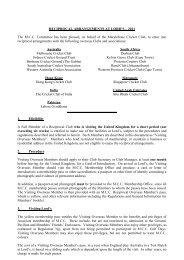Issue 42: Spring 2010 - Melbourne Cricket Club
Issue 42: Spring 2010 - Melbourne Cricket Club
Issue 42: Spring 2010 - Melbourne Cricket Club
You also want an ePaper? Increase the reach of your titles
YUMPU automatically turns print PDFs into web optimized ePapers that Google loves.
"Proud To<br />
Emulate"<br />
A Tribute to<br />
Major Everett Pope MOH<br />
Sometimes, when the occasional cool day struck Amelia Island,<br />
Florida, an old man, with white hair and a quick smile, could<br />
sometimes be seen sporting a <strong>Melbourne</strong> <strong>Cricket</strong> Ground sweater<br />
as he took his afternoon walk. Once he had worn the forest green<br />
of the United States Marine Corps, but that was long ago.<br />
Now, in his twilight years, he was reluctant to talk about those<br />
days. Instead, he preferred to discuss the weather or his<br />
grandchildren. When he was asked for his thoughts about the<br />
young men being sent to fight in Iraq, tears welled in his bright<br />
blue eyes, for Everett Parker Pope understood only too well the<br />
dreadful and enduring price exacted by war.<br />
A couple of generations earlier, he himself had been one of the<br />
young men who went off to war. Just after graduating magna<br />
cum laude from the prestigious Bowdoin College in 1941, he<br />
had enlisted in the United States Marine Corps. When the<br />
1st Battalion of the First Division's 1st Regiment landed on<br />
Guadalcanal on August 7, 19<strong>42</strong>, Second Lieutenant Pope was in<br />
charge of a machine gun platoon. He was 23.<br />
The "Canal" changed Everett Pope and his fellow Marines forever.<br />
Combat left an indelible mark on them, replacing their innocence<br />
with a hardness that would have been incomprehensible a year<br />
before. In his diary, 21-year-old Jim Donahue asked:<br />
"How does it feel to kill someone?" You don't stop to think.<br />
There is a man intent on killing you so you kill or be killed. 1<br />
In his book Helmet For My Pillow, Robert Leckie wrote that the<br />
eyes of the young Marines quickly acquired "that aspect peculiar<br />
to Guadalcanal, that constant stare of pupils that seemed darker,<br />
larger, rounder, more absolute." Leckie also showed that, as<br />
men like Pope struggled to survive in the thick and humid jungle,<br />
they understood the terrible truth that every army had items that<br />
could, if necessary, be sacrificed:<br />
Men are the most expendable of all. Hunger, the jungle, the<br />
Japanese, not one nor all of these could be quite as corrosive<br />
as the feeling of expendability. 2<br />
While the First Division contained a core of veterans who knew<br />
their weapons and tactics, too many Marines on Guadalcanal were<br />
untried recruits with, at best, eight months in uniform. Everett Pope<br />
was leading men equipped with weapons of World War I vintage as<br />
they faced experienced Japanese troops in a bitter struggle that<br />
was well defined by historian Samuel Eliot Morison:<br />
Guadalcanal is not a name but an emotion, recalling<br />
desperate fights in the air, furious night naval battles, frantic<br />
work at supply or construction, savage fighting in the sodden<br />
jungle, night broken by screaming bombs and deafening<br />
explosions of naval shells. 3<br />
As John Joseph, a fellow member of Pope's 1st Regiment,<br />
put it, "The 'Canal' was as bad as it has been written by many<br />
historians." According to William Manchester:<br />
The typical Marine on the island ran a fever, wore stinking<br />
dungarees, loathed twilight and wondered whether the US<br />
Navy still existed. He ate mouldy rations and quinine. He<br />
alternately shivered and sweated … If he was on his way<br />
back to the line, he struggled through shattered, stunted<br />
coconut trees, scraggy bushes, and putrescent jungle,<br />
clawing up and down slopes ankle-deep in mud, hoping he<br />
could catch a few hours of uninterrupted sleep in his foxhole.<br />
Usually he was disappointed … 4<br />
At the height of this nightmare, Lieutenant Pope probably shared<br />
the view of Jim Donahue, who wondered "if any of us will get<br />
back." By the time First Division was evacuated just before<br />
Christmas, 1152 Marines were dead, 2799 were wounded, and 95<br />
percent of the original landing force was unfit for combat, mostly<br />
through malaria. Everett Pope and his fellow survivors sailed<br />
from Guadalcanal to Australia with "a spirit of cohesion that binds<br />
a unit together and binds people together." They also took with<br />
them mental scars that would later prevent them from freely<br />
discussing the war.<br />
When the First Regiment took up their quarters at the <strong>Melbourne</strong><br />
<strong>Cricket</strong> Ground in January 1943, one officer described the 3600<br />
Marines as "ragged, still dirty, thin, anaemic, sallow, listless." On<br />
top of that, they were undernourished and dehydrated. However,<br />
after their terrible experiences on the Canal, and despite the<br />
cold, spartan conditions in the stands, Everett Pope and the First<br />
Regiment regarded the MCG as "Heaven".<br />
12<br />
The Yorker - <strong>Spring</strong> <strong>2010</strong>



